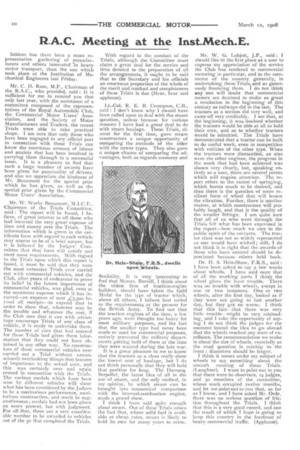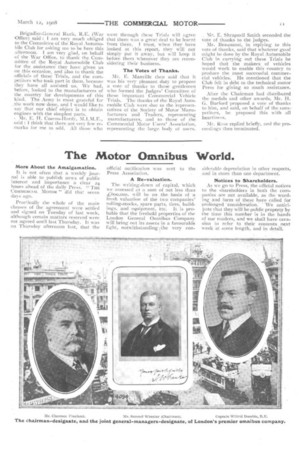RA.C. Meeting at the InstsMech.E.
Page 12

Page 13

If you've noticed an error in this article please click here to report it so we can fix it.
Seldom has there been a more representative gathering of manufacturers and others interested 'in heavy motor transport, than the one which took place at the Institution of Me-chanical Engineers last Friday.
Mr. C. D. Rose, M.P., Chairman of the R.A.C., who presided, said : It is sufficient for me to remind you that only last year, with the assistance of a committee composed of the representatives of the Royal Automobile Club, the Commercial Motor Users' Association, and the Society of Motor Manufacturers and Traders, the recent Trials were able to take practical shape. I am sure that only those who have been engaged in any official part in connection with these Trials can know the enormous amount of labour and anxiety that has been involved in carrying them through to a successful
issue. It is a pleasure to find that such a large number of awards have been given for punctuality of drivers, and also we appreciate the kindness of Mr. -Beaumont for the special prize which he has given, as well as the special. prize given by the Commercial Motor Users' Association.
Mr. W. Worby Beaumont, M.I.C.F.,, Chairman of the Trials Committee, said : The report will be found, I believe, of great interest to all those who had incurred the very great expense of time and money over the Trials. The information which is given in the certificate form with regard to each vehicle may appear to he of a brief nature, but it is believed by the Judges' Committee that that form will satisfy and meet most requirements. With regard to the Trials upon which this report is based, it must be said that they were the most extensive Trials ever carried out with commercial vehicles, and the Club, after years of endeavour to prove its belief in the future importance of commercial vehicles, was glad, even at the enormous expense which it has incurred—an expense of over A..„-3,5oo beyond all receipts—to expend that in order to show that, whatever may be the trouble and whatever the cost, if the Club sees that it can with advantage encourage Trials of any class of vehicle, it is ready to undertake them. The number of cars that had entered for these Trials had given them information that they could not have obtained in any other way. No constructors of these commercial vehicles ever carried out a Trial without unconsciously overlooking things that become of importance to the actual user, and this was certainly over and again proved in connection with the Trials. The various medals which have been won by different vehicles will show what has been considered by the Judges to he a meritorious performance, meritorious construction, and merit in suge-estiveness ; medals had not been given on every pretext, but with judgment. For all' that, there are a very considerable number to be awarded to vehicles out of the 5o that completed the Trials.
With regard to the conduct of the Trials, although the Committee must claim a great deal for the service and time devoted to the preparation of all the arrangements, it ought to be said that to the Secretary and his officials an enormous proportion of the whole of the merit and conduct and completeness of these Trials is due (Hear, hear and applause).
Lt.-Col. R. E. B. Crompton, C.B., said : I don't know why I should have been called upon to deal with the steam question, unless because for various reasons I have had a great deal to do with steam haulage. These Trials, almost for the first time, gave steam constructors a unique opportunity of comparing the methods of the older with the newer types. They also gave a unique chance of comparing the advantages, both as regards economy and
flexibility. It is very interesting to find that Messrs. Burrell, I think about the oldest firm of traction-engine builders, should have taken the Gold Medal for the type of tractor which, above all others, I believe best suited to the requirements at the present for the British Army. To find out that the traction engines of the time, a few years ago, were thought too heavy for most military pUrpoee.s, and the fact that the smaller type had never been made or used for commercial purposes, entirely prevented the military departments getting hold of them at the time they were wanted during the late war.
It is a great pleasure to me to know that the tractors as a class really show the lowest cost of haulage, but I do not think personally that they will hold that position for long. The DarracqSerpollet, the latest idea of all in the use of steam, and the only method, in my opinion, by which steam can be brought into economical comparison with the internal-combustion engine, made a grand show.
I think I have said quite enough about steam. Out of these Trials arises the fact that, where solid fuel is available at cheap rates, steam is likely to hold its own for many years to come.
Mr. W. G. Lobjoit, J.P., said: I should like in the first place as a user to express my appreciation of the service the Club has rendered to commercial motoring in particular, and to the commerce of the country generally, in undertaking these Trials, and so generously financing them. I do not think any one will doubt that commercial motors are destined to make as great a revolution in the beginning of this century as railways did in the last. The tractors as a section did very well, and came off very creditably. I see that, at the beginning, it was doubted whether the tractors would be able at all to hold their own, and as to whether tractors would be admitted. The Trials have demonstrated that a tractor can be built to do useful work, even in competition with vehicles of the other type. When the tractors were dismantled, as also were the other engines, the progress in the work that had been achieved was shown very clearly, but, speaking entirely as a user, there are several points which will require attention. The report refers to the extent of springing, which leaves much to be desired, and then there is the question of some resilient form of wheel that will lessen the vibration. Further, there is another matter, at which constructors will probably laugh, and that is the quality of the smaller fittings. I am quite sure that all of us who went through the Trials felt what has been expressed in the report—how much we owe to the public spirit of the entrants. The tractor class was not so widely represented as one would have wished ; still, I do not think it is right that the awards of those who have entered should be depreciated because others held back.
Dr. FL S. Hele-Shaw, F.R.S., said : I have been asked to say a few words about wheels. I have said once that of all the working parts I think the wheel gives the least trouble. There was no trouble with wheels, except in one or two instances. One or two wheels, after the first day, looked as if they were not going to last another day, but they got no worse. I think that this fact—that there was very little trouble—might be very misleading, and I take the opportunity of saying I do not think the judges for the moment intend the idea to go abroad that the wheels reached any state of excellence. The recommendation we make is about the size of wheels, especially as the road question is coming to the front : diameters should be larger.
I think it comes under my subject of wheels to say something about the smooth running of these Trials. (Laughter). I want to point out to you that there were 6o observers, ILI. judges, and 3o members of the committee, whose work occupied twelve months, and let me point out to you that, as far as I know, and I have asked Mr. Orde, there was no serious question of frietion throughout the Trials. I think that this is a very good record, and one the result of which I hope .is going to keep this country in the forefront of heavy commercial traffic. (Applause). Brigadier-General Ruck, R.E. (War
• Office) said 1 am very much obliged to the Committee of the Royal Automobile Club for asking me to be here this afternoon. I am very glad, on behalf of the War Office, to thank the Committee of the Royal Automobile Club for the assistance they have given us on this occasion, and also to thank the officials of these Trials, and the competitors who took part in them, because they have all assisted us. We had, before, looked to the manufacturers of the country for developments of this kind. The Army is most grateful for _the work now done, and I would like to sny that our chief object is to obtain engines with the simplest parts.
= Mr. E. TT. Cozens-Hardy, M.I.M.E., said : I think that there are very few re.1-narks for me to add. All those who
vent through these Trials will agree that there was a great deal to be learnt from them. I trust, when they have looked at this report, they will not simplyput it away, but will keep it before them whenever they are reconsidering their business.
The Votes of Thanks.
Mr. E. Manville then said that it was his very pleasant duty to propose a vote of thanks to those gentlemen who formed the Judges' Committee of these important Commercial Vehicle Trials. The thanks of the Royal Automobile Club were due to the representatives of the Society of Motor Manufacturers and Traders, representing manufacturers, and to those of the Commercial Motor Users' Association, representing the -large body of users. . Mr. E. Shrapnel' Smith seconded the vote of thanks to the judges.
• Mr. Beaumont, in replying to this vote of thanks, said that whatever good might be done by the Royal Automobile Club in carrying out these Trials he hoped thal the makers of vehicles would work to enable this country to produce the most successful commercial vehicles. He mentioned that the Club felt in debt to the technical motor Press for giving so lunch assistance.
After the Chairman had distributed the medals and other awards, Mr. H. G. Burford 'proposed a vote of thanks to him, and said, on behalf of the competitors, he proposed this with all heartiness.
Mr. Rose replied briefly, and the proceedings then terminated.


























